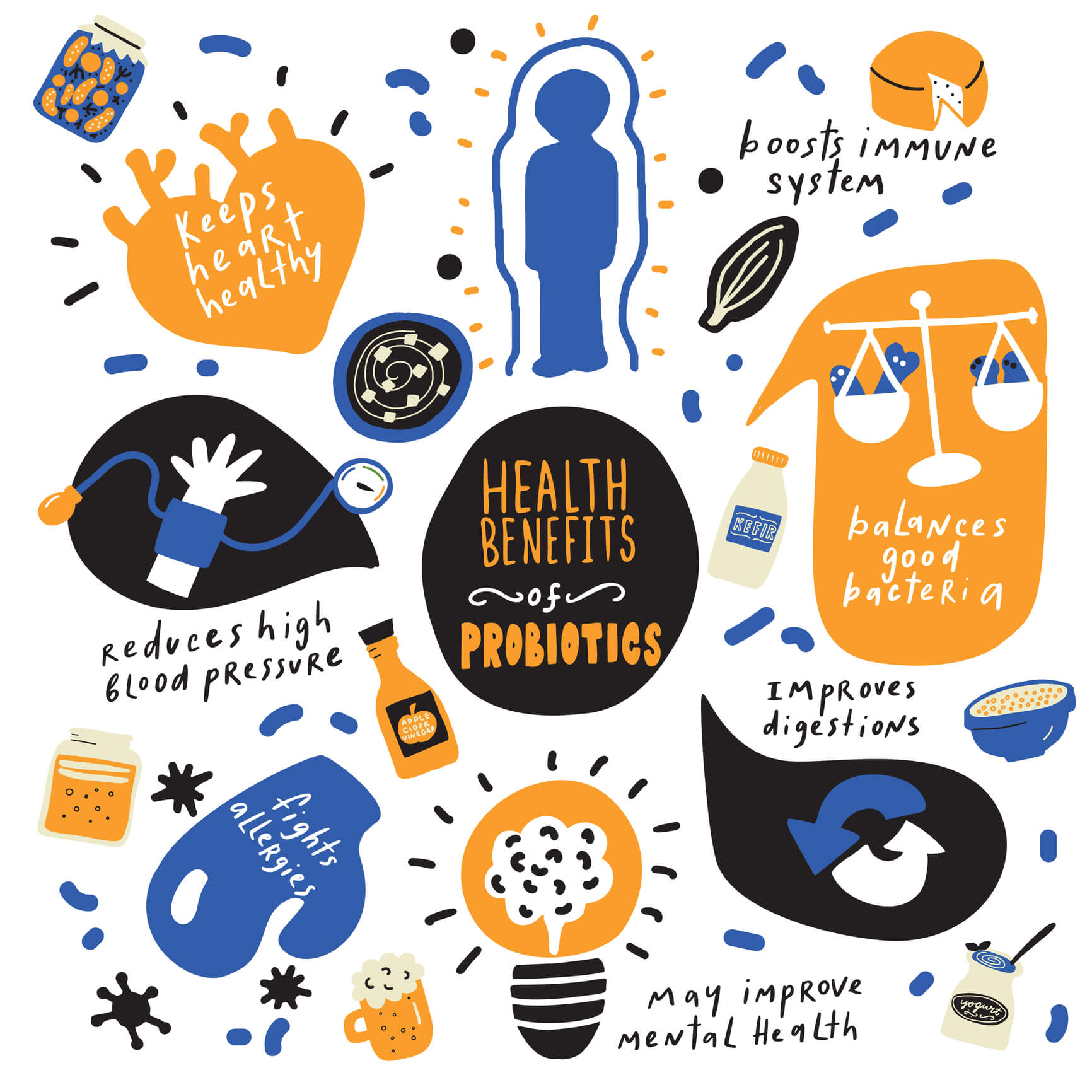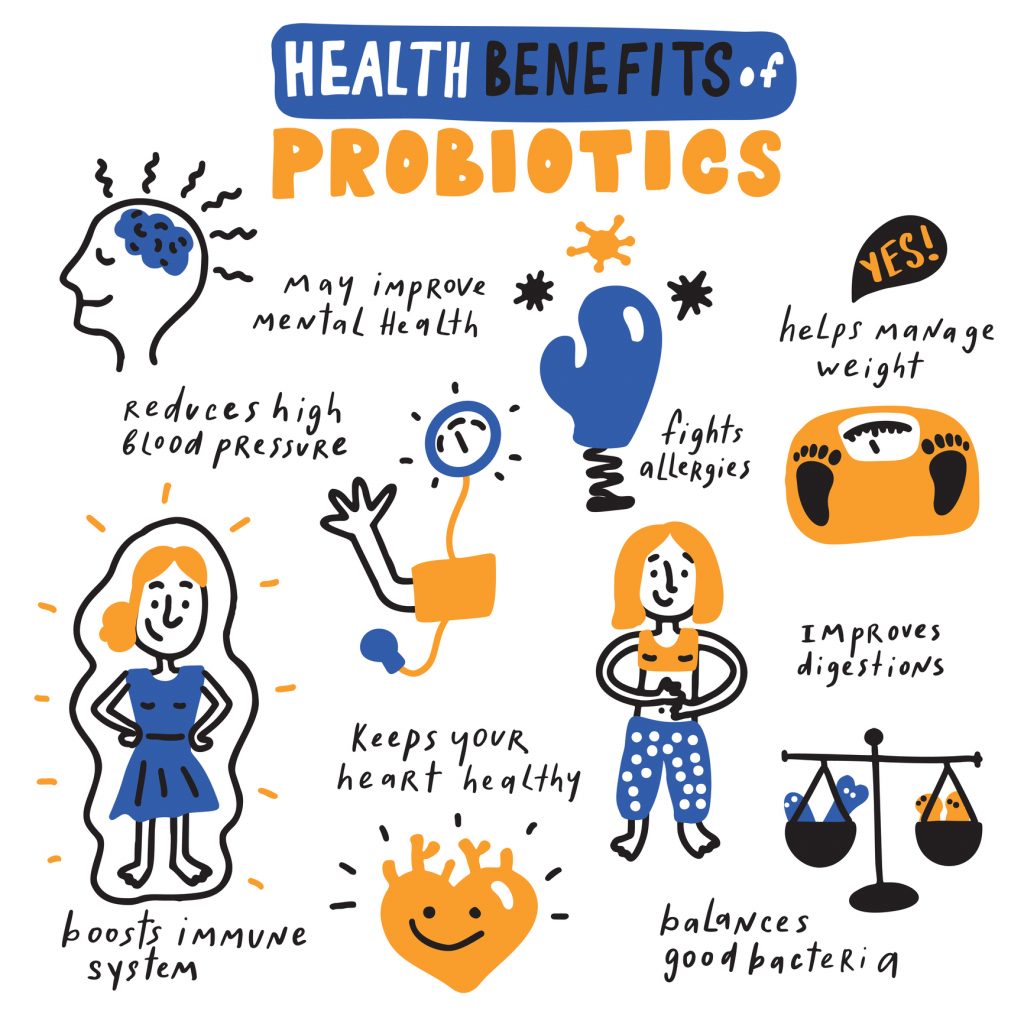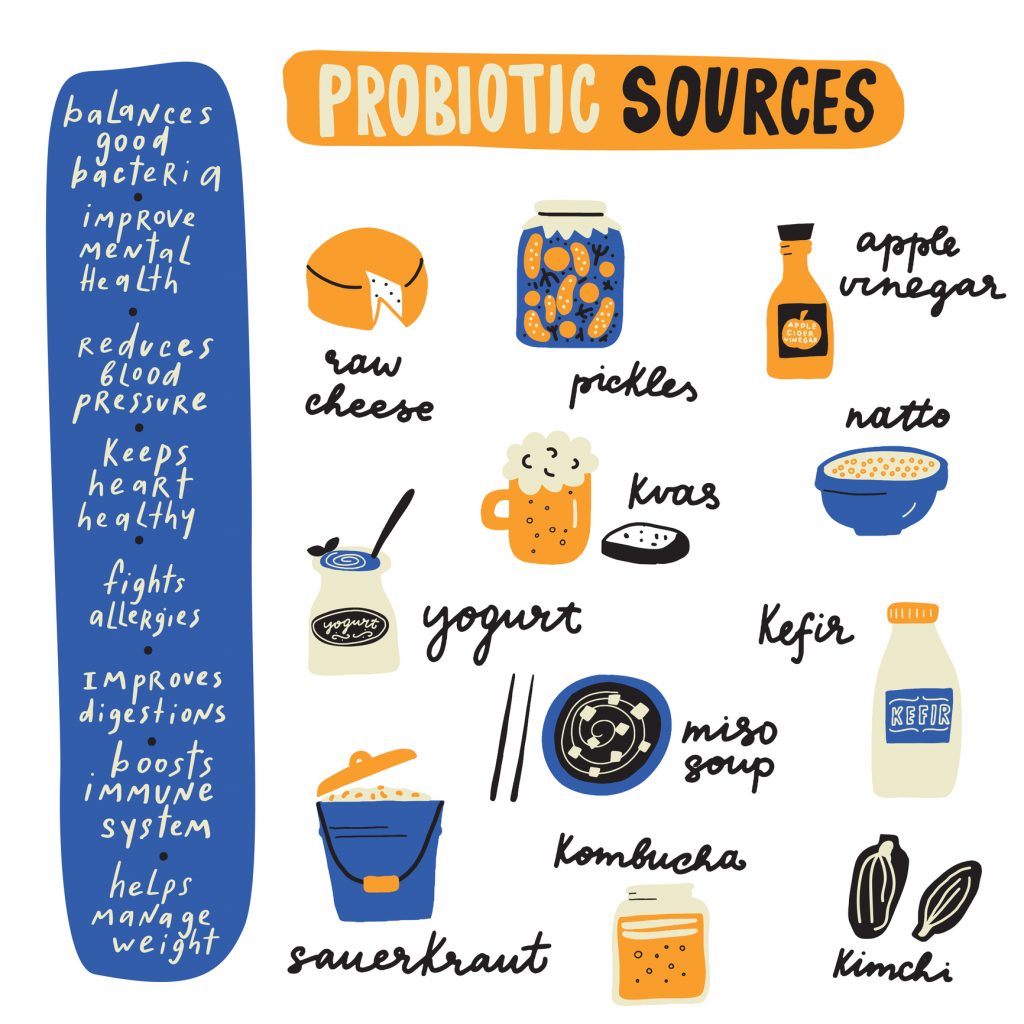10 Health Benefits of Probiotics

As an affiliate, we may earn a commission from qualifying purchases. We get commissions for purchases made through links on this website from Amazon and other third parties.
Probiotics are one of the most important supplements you can take, but many people don’t know why or how they work.
Most people only think about probiotics when they have a stomachache or are trying to get over a cold. However, the health benefits of probiotics range are vast and can benefit many areas of your health that everyone should know about.
Almost everyone has heard of probiotics, and many people take them regularly in the hopes of maintaining gut health and boosting their immune system. But what are probiotics, exactly? And what are the specific benefits of taking them?
This post will explore the answers to these questions, and provide a few tips on how to reap the most benefit from probiotics. Stay healthy!

What are Probiotics?
Probiotics, or “good bacteria”, are beneficial microorganisms that help restore the balance between good and bad bacteria in your gut. This can be done through several different mechanisms, but mainly they do this by following certain substances (namely sugars) into the intestines where they then proliferate.
The most common name-brands of probiotics are Yakult, Actimel, and Activia; you can find these at any grocery store or drugstore.
Here’s a list of the top 10 health benefits of probiotics:
1. Probiotics improve digestion and nutrient absorption: When good bacteria take over and crowd out the bad bacteria, this helps your body to absorb nutrients better. This can be especially helpful for those who are lactose intolerant or have trouble digesting dairy products.
2. Probiotics reduce inflammation: Inflammation throughout the body has been linked to heart disease, diabetes, arthritis, Alzheimer’s disease, and other complications. By helping to reduce inflammation, probiotics can help protect your body from these diseases.
3. Probiotics increase the production of serotonin: Probiotics contain brain chemicals that allow them to communicate with your brain and nervous system through what is known as the “gut-brain axis”. There are several different substances that probiotic bacteria secrete that have been shown to improve mood and behavior. One of these substances is serotonin, which is the same chemical in your brain that is elevated when you are depressed or anxious. In fact, researchers believe that certain forms of depression may be caused by a lack of good bacteria in the gut.
4. Probiotics increase dopamine: Probiotics have been shown to increase the production of dopamine, a neurotransmitter that is responsible for feelings of happiness and pleasure.
5. Probiotics reduce anxiety: Probiotics have also been shown to decrease the expression of genes related to stress responses, which in turn may help with anxiety disorders.
6. Probiotics boost memory: Keeping your gut healthy with probiotics may also affect how well you remember things. A study at UCLA found that mice who were given Lactobacillus chivii (a common probiotic strain) performed better on memory tests than mice without the supplement.
7. Probiotics reduce autism risk: A study conducted by the California Institute of Technology found that certain forms of gut bacteria can actually reduce the risk of autism. This study suggests that supplementing with probiotics during pregnancy might help to lower a child’s risk for developing this disorder.
8. Probiotics improve acne: Probiotics have been shown to reduce inflammation which in turn helps to prevent the development of acne.
9. Probiotics reduce the risk of allergies: Probiotics may also help to prevent the development of allergies because they strengthen our immune systems. A study at UCLA found that children who took a probiotic supplement were 40% less likely to develop an allergy by age 5 than those who didn’t take the supplement.
10. Probiotics fight off bacterial infections: Probiotics also help to protect us from harmful bacteria and viruses that can lead to disease.

How do they work?
The gut-brain axis refers to the connection between your gastrointestinal tract and your central nervous system (CNS). This is a two-way street; just as the gut can send signals to affect mood and behavior, so can your brain via this axis.
The best example is what happens when you get “butterflies” in your stomach before a big test or date; these butterflies are caused by stress and anxiety and they’re brought on because of messages that travel down the gut-brain axis.
There’s also evidence that the gut can send signals to fight against infections, so keeping your gut healthy with probiotics may be another way to prevent the development of certain diseases.
Are they safe?
Probiotics are generally considered safe, although there are some safety concerns by people who have specific health conditions. For example, if you’re immune-compromised, have a central venous catheter, or are on an antibiotic, you should speak to your doctor before taking probiotics.
What are the different types of probiotics?
There are many different species of “good” bacteria that can be taken as a supplement. These include:
- Lactobacillus bulgaricus
- Lactobacillus acidophilus
- Bifidobacterium bifidum
- Several species of Streptococcus
Most strains are available by prescription or over-the-counter.

Are they necessary?
While scientific research is still in its early stages, there is evidence that probiotics can be beneficial for certain health conditions. However, it’s not clear whether taking them is necessary for everyone or if they are helpful, what the best strains are to take.
There are some things you can do to naturally maintain a healthy gut environment, however, such as getting enough fiber and exercise, eating fermented foods like yogurt and sauerkraut, and reducing stress.
If you think you have a problem with your gut or digestive system, talk to your health care provider before taking probiotics.
In conclusion
Probiotics are a great way to enhance your gut health and improve the function of your immune system. With the power of probiotics, you can make your gut happy and healthy. Remember to take a probiotic supplement daily if you are not eating enough fermented foods or taking care of your health by exercising regularly.
There are a number of different ways that probiotic supplements can help you and your family maintain overall good health. Despite the many benefits, there is no one-size-fits-all solution for everyone’s needs – which is why it’s important to consult with a doctor or nutritionist before starting any new regimen.
We hope this article has been helpful in showing some of the potential health benefits associated with taking probiotics!
A quick reminder ..
Probiotics.tips aim to provide the most up-to-date information, help, and advice for YOU to make informed decisions. If you are unsure or uncertain and require more clarity, please reach out to us and we will gladly come back and advise you as best we can.
The best means to reach us is via email at info@probiotics.tips or fill out the form on our Contact Us page – click here.
Probiotics.tips
About Us
Our goal is to empower you with concise probiotic guidance for a healthier gut. With expert advice, we provide the knowledge to improve your well-being and navigate the world of probiotics efficiently, ensuring you achieve optimal gut health.
- Can You Take Probiotics While Water Fasting?
- Does Fasting Help Microbiome Diversity and Functionality?
- Does Fasting Help Your Bowels
- Does Fasting Help Probiotics? Understanding Gut Health Benefits
- Does Fasting Help the Gut: Understanding the Impact on Digestive Health
Disclaimer
As an affiliate, we may earn a commission from qualifying purchases. We get commissions for purchases made through links on this website from Amazon and other third parties.
Check these out on Amazon








